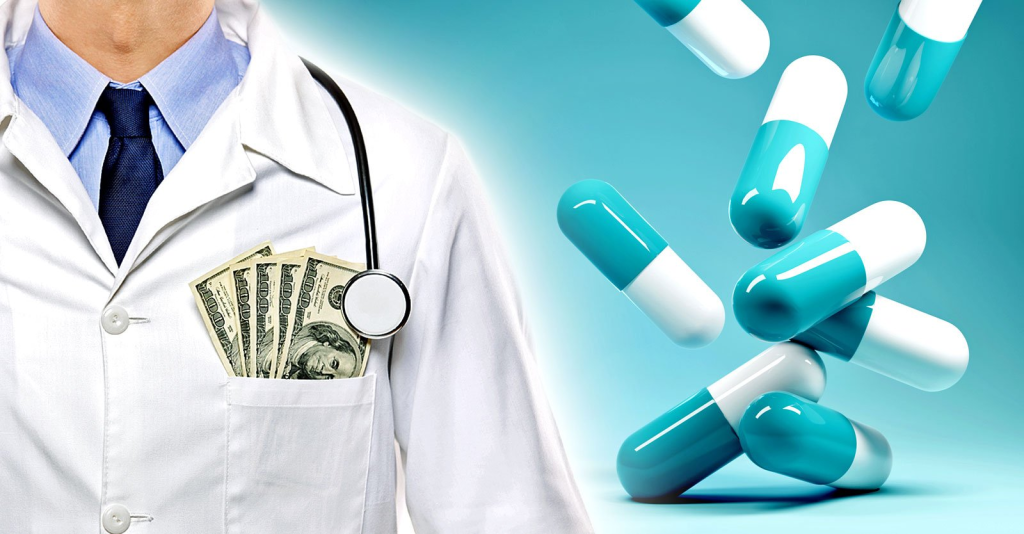
Please Follow us on Gab, Minds, Telegram, Rumble, Gettr, Truth Social, Twitter
Makers of drug and medical devices target doctors early in their careers, through payments, free meals and sponsored education, to “cultivate long term, reciprocal relationships,” according to the authors of an editorial published Monday in The BMJ.
“Ultimately, these relationships threaten the sustainability of healthcare and expose patients to unnecessary risk or harm,” wrote Alice Fabbri, Ph.D., and Quinn Grundy, Ph.D.
Fabbri is a health department lecturer at the University of Bath in England. Grundy is an assistant professor of nursing at the University of Toronto in Canada. In their Sept. 9 editorial, they cited studies documenting levels of Big Pharma industry payments made to early-career physicians.
For instance, a study published Sept. 1 in JAMA Internal Medicine showed that among 5,533 U.S. cardiology fellows, 73% received “industry marketing payments” in the year before graduating and 88% received payments in the first few years after they graduated.
“For fellows in specialties that use a lot of technology (referred to as ‘procedural intensive’),” Fabbri and Grundy noted, “the proportion was even higher: 80% received payments before graduating, and 96% afterwards.”
More industry payments are given to cardiologists than to any other type of specialist, they said. “In one study, just 11 of 195 directors of cardiac catheterisation and electrophysiology laboratories received no industry payments in a single calendar year.”
A 2018 analysis of industry payments received by cardiologists revealed that payments fell into 1 of 12 categories:
Industry payments influence doctors’ decision-making
Research shows that industry payments influence doctors’ decision-making, Fabbri and Grundy said. “Even the receipt of low value industry-sponsored meals is associated with increased prescribing of the promoted brand name medication.”
Another JAMA Internal Medicine study — published in 2016 — reported on the prescription choices of 2,444 doctors, revealing that as the amount of money doctors received in industry payments increased, so did the likelihood that the doctors would prescribe brand-name statins.
A team of U.K. scientists recently recommended doctors begin prescribing statins to patients as young as age 15.
Statins are prescription drugs people take to lower the level of “bad” cholesterol that builds up in arteries, according to the Cleveland Clinic.
Researchers in 2018 found a similar trend linking increased industry payments with an increase in the number of doctors prescribing opioids.
Increased drug promotion can negatively affect patients’ health “by contributing to overtreatment, undertreatment, and mistreatment,” Fabbri and Grundy said.
Medical schools need to address conflict of interest
Medical schools need to address early on in students’ curriculum the possibility that receiving industry payments can create a conflict of interest, Fabbri and Grundy said:
“Educational interventions should challenge the common belief among health professionals that they are immune to commercial influence, teach them how to critically assess information received from industry … and point them to independent sources of prescribing information.”
Medical schools and training hospitals also should set policies for their staff who oversee medical students to prevent staff from modeling problematic behavior.
The authors of The BMJ op-ed wrote:
“If students are trained in environments that lack policies to regulate relationships with industry and witness their supervisors and teachers interacting with industry on a daily basis, they absorb and normalise this behaviour.
“Medical schools, teaching hospitals, and healthcare institutions need explicit institutional policies that promote and sustain independent clinical decision making (such as eliminating gifts and industry sponsored meals), and robust, enforceable processes to prevent or manage conflicts of interest arising from financial and gift relationships with industry.”
Medical students themselves have advocated for a conflict-free training environment, Fabbri and Grundy said.
In 2019, the International Federation of Medical Students’ Associations issued a policy statement that called for a “careful delineation of commercial and medical interests … to allow students to exercise their critical sense and limit the impact of influences they have been subjected to during their medical curriculum for their future practice.”
Meanwhile, a 2022 systematic review showed that the prevalence and content of conflict-of-interest policies at medical schools and teaching hospitals still varied greatly across countries.
The Defender reached out to Fabbri for comment but she was unable to respond by our deadline.
“© [2024] Children’s Health Defense, Inc. This work is reproduced and distributed with the permission of Children’s Health Defense, Inc. Want to learn more from Children’s Health Defense? Sign up for free news and updates from Robert F. Kennedy, Jr. and the Children’s Health Defense. Your donation will help to support us in our efforts.

Economist Paul Zane Pilzer described this perfectly in his book "The Wellness Revolution." The pharma companies hire "detail people" i.e. young, attractive people of the opposite sex to invite these doctors to exotic locales for "education" purposes. The doctors then, coincidentally, start writing prescriptions for the drugs these pharma companies manufacture. The "healthcare" industry is really the "sickness" industry, because it creates problems that will need to be perpetually managed.